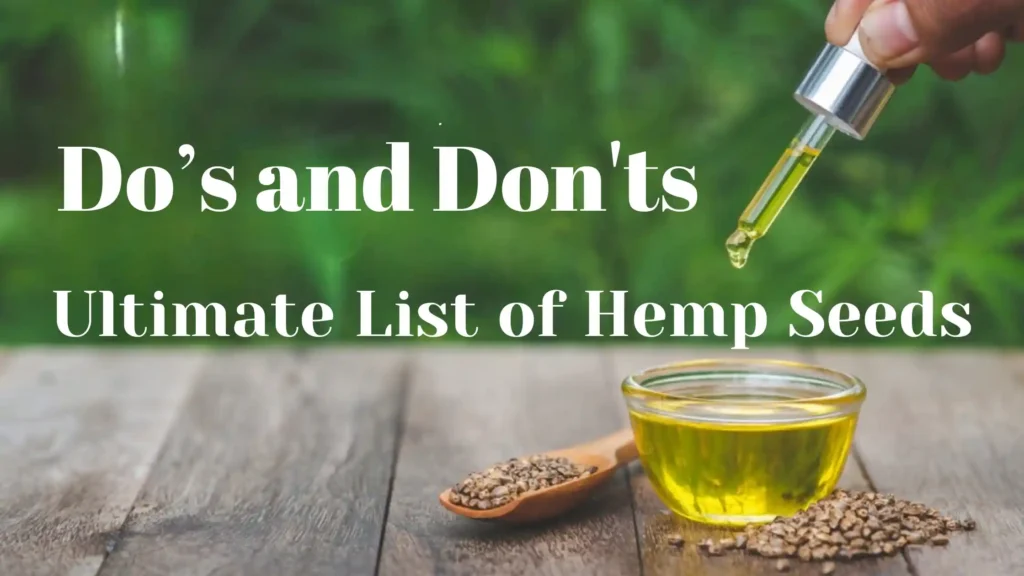Hemp seeds, derived from the Cannabis sativa plant, have gained immense popularity in recent years due to their impressive nutritional profile and potential health benefits. As a rich source of protein, healthy fats, vitamins, and minerals, hemp seeds are a versatile addition to any diet. Hemp seed oil is also a very beneficial component, having many medicinal and wellness advantages. However, like any other food, there are certain do’s and don’ts to consider to maximize their benefits and ensure safety.
In this comprehensive guide, we will explore the ultimate list of hemp seeds’ dos and don’ts, helping you make the most of these tiny powerhouses of nutrition. Let’s explore the benefits of hemp seeds benefits that can enhance your life’s health experiences.
The Do’s of Hemp Seeds
-
Do Incorporate Hemp Seeds into Your Diet Gradually
Hemp seeds are highly nutritious, but sudden changes in your diet can sometimes cause digestive discomfort. To avoid this, start by incorporating a small amount of hemp seeds into your meals and gradually increase the quantity over time. This allows your body to adapt to the new food and prevents any adverse reactions.
-
Do Choose Quality Sources
When purchasing hemp seeds, always opt for high-quality, organic, and non-GMO products. Look for reputable brands that ensure their products undergo rigorous testing to meet quality standards and are free from contaminants. Because hemp seed nutrition can vary according to the various brands or the quality of their seeds.
-
Do Store Hemp Seeds Properly
To maintain the freshness and nutritional value of hemp seeds, store them in an airtight container in a cool, dry place. Exposure to heat, light, and air can lead to the degradation of the healthy fats present in hemp seeds.
-
Do Balance Omega-3 and Omega-6 Fatty Acids
Hemp seeds contain both omega-3 and omega-6 fatty acids, essential for overall health. However, it’s crucial to maintain a balanced ratio between these two fats. The ideal ratio is around 3:1 or 4:1 (omega-6 to omega-3). Many modern diets are already high in omega-6 fatty acids, so consuming hemp seeds can help correct the imbalance.
-
Do Grind Hemp Seeds for Enhanced Nutrition
While whole hemp seeds are valuable, grinding them before consumption can increase nutrient absorption. Grinding releases more of the beneficial compounds, making it easier for your body to assimilate the nutrients.
-
Do Use Hemp Seeds as a Plant-Based Protein Source
Hemp seeds are an excellent protein source for vegans and vegetarians. They contain all nine essential amino acids, making them a complete protein. Use hemp seeds in smoothies, and salads, or sprinkle them over various dishes to boost your protein intake.
-
Do Include Hemp Seeds in a Balanced Diet
While hemp seeds are nutritious, they shouldn’t be the sole focus of your diet. Incorporate them as part of a balanced and diverse eating plan, including a variety of fruits, vegetables, whole grains, and other protein sources.
The Don’ts of Hemp Seeds
Don’t Rely on Hemp Seeds for CBD Benefits
While hemp seeds come from the same plant family as CBD-rich hemp, they do not contain significant amounts of CBD. If you are looking for the potential therapeutic benefits of CBD, you should explore dedicated CBD products instead.
Don’t Overconsume Hemp Seeds
While hemp seeds are highly nutritious, moderation is key. Like all foods, excessive consumption can lead to an imbalance in your diet and may cause unwanted side effects. A couple of tablespoons of hemp seeds per day is generally sufficient to reap their benefits.
Don’t Forget to Drink Water
Hemp seeds are a good source of fiber, which is beneficial for digestive health. However, consuming fiber-rich foods like hemp seeds requires an adequate intake of water to prevent constipation. Stay hydrated to ensure the smooth functioning of your digestive system.
Don’t Give Hemp Seeds to Pets
While hemp seeds are safe and healthy for humans, they may not be suitable for pets. Consult with a veterinarian before introducing hemp products into your pet’s diet, as animals have different dietary requirements.
Don’t Heat Hemp Seeds Excessively
The healthy fats in hemp seeds can become damaged when exposed to high temperatures. Avoid overheating hemp seeds and refrain from using them in high-temperature cooking methods. Instead, add them to dishes after cooking or use them in recipes that don’t require cooking.
Don’t Assume Hemp Seeds Will Cause Psychoactive Effects
Hemp seeds do not contain significant levels of THC, the psychoactive compound found in marijuana. Consuming hemp seeds will not cause intoxication or alter your state of mind.
Conclusion
In conclusion, hemp seeds are a fantastic addition to any diet, offering an array of nutrients and potential health benefits. By following the dos and don’ts outlined in this guide, you can make the most of these nutritious seeds while ensuring your safety and well-being. Remember to incorporate hemp seeds gradually, opt for quality sources, and store them properly to maintain their freshness. Balance your intake of omega-3 and omega-6 fatty acids, and consider grinding hemp seeds to enhance nutrient absorption. Furthermore, utilize hemp seeds as part of a balanced diet, but avoid relying solely on them for specific therapeutic benefits. With these guidelines in mind, you can harness the full potential of hemp seeds and enjoy their numerous health advantages for years to come.


Pingback: Ultimate List of Hemp seeds does and don'ts | C...